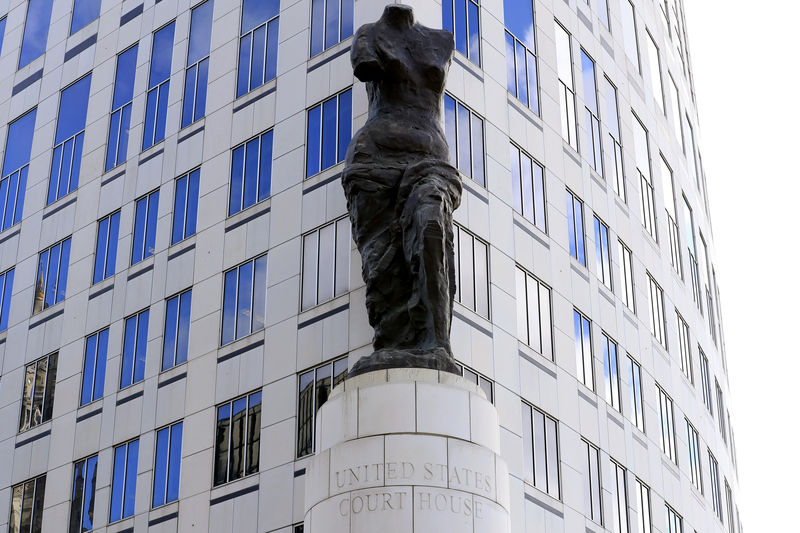By Kathy Gray
CLEVELAND (Reuters) - Four large drug companies reached a last-minute $260 million legal settlement over their role in the U.S. opioid addiction epidemic, striking a deal with two Ohio counties to avert the first federal trial over the crisis.
Drug distributors AmerisourceBergen Corp (N:ABC), Cardinal Health Inc (N:CAH) and McKesson Corp (N:MCK) will contribute $215 million toward the settlement, according to Hunter Shkolnik, an attorney for the counties.
Israel-based drugmaker Teva Pharmaceutical Industries Ltd (TEVA) is paying $20 million in cash and will contribute $25 million worth of Suboxone, an opioid addiction treatment, according to Shkolnik.
The deal settles claims brought by Ohio's Cuyahoga and Summit counties, which had accused the companies of fueling a nationwide opioid crisis. Some 400,000 U.S. overdose deaths between 1997 and 2017 were linked to opioids, according to government data.
The trial was to be a so-called bellwether or test trial that was meant to help shape a broader settlement of some 2,600 lawsuits pending over the toll opioids have taken on local communities and the nation.
Late on Friday, talks collapsed that were aimed at reaching a $48 billion global settlement of all opioid litigation against the same defendants.
Shares in the companies had risen last week in anticipation of a broader deal. On Monday, shares of the big three drug distributors were down about 3% to 4%.
The judge overseeing the Ohio case, Dan Polster, urged the parties on Monday to continue to work toward a broader deal.
"I did not encourage a settlement of this case only," Polster said in court.
Polster said he would work out a new trial date for the remaining defendant, pharmacy chain operator Walgreens Boots Alliance Inc (O:WBA).
Lawyers representing the local governments said in a statement on Monday that the litigation had revealed the country's pharmacy system "has played a greater role in the opioid epidemic than previously realized."
Walgreens said in a statement on Monday that it only sold opioids to fill a valid prescription written by a licensed physician. It said it was diligent to prevent the diversion of controlled substances.
A sixth defendant, the smaller distributor Henry Schein Inc (O:HSIC), said on Monday it had been dismissed as a defendant from the trial after agreeing to a deal for around $1.25 million.
The lawsuits accuse drug makers of overstating the benefits of opioids while downplaying the risks. Distributors allegedly failed to flag and halt a rising tide of suspicious orders, shipping vast amounts of the pills across the country.
Drugmakers have denied wrongdoing, arguing their products carried U.S. Food and Drug Administration-approved labels that warned of the addictive risks of opioids. They say they did not cause the toll the epidemic has had on states and localities.
Distributors have said that they made up only "one component of the pharmaceutical supply chain" and their role was to make sure medicines prescribed by licensed doctors were available for patients.
Monday's settlements add to deals worth $66.4 million that the two counties earlier struck with drug companies Mallinckrodt Plc (N:MNK), Endo International Plc (O:ENDP), Johnson & Johnson (N:JNJ) and Allergan Plc (N:AGN).
Cuyahoga County has said it will use the funds to expand residential treatment beds, increase emergency care follow-up and to create alternatives to jailing low-level drug offenders, among other initiatives.
Friday's settlement talks broke down in part because of tension between state attorneys general, whose cases are not before Polster, and the local government cases consolidated in Cleveland.
Attorneys general were supportive of a deal in recent settlement talks that Shkolnik rejected on Monday as "a bargain basement settlement" for "pennies on the dollar."
